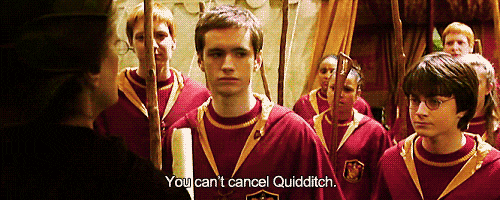Can We Fix Hogwarts Quidditch, Please?
I played three high school sports, and I learned from each of them. Running Cross Country, I learned how satisfying it can be to work hard. Starting hockey in my junior year, I learned how much you can accomplish in a brief period of time if you’re willing to do the work. And in four years of baseball, I learned that whether you’re a starting catcher on JV or a third-string first baseman on varsity, it’s great just to be part of a team, all working together toward a common goal.
School sports build work ethic; they teach participants the importance of taking tasks seriously; they’re a fantastic outlet for energy and competition, and they’re also just lots of fun. This, presumably, is why Hogwarts offers Quidditch – but there’s a lot that the school can do to make its Quidditch program work better and fully realize its benefits.
Right off the bat (pun!), one glaring issue stands out: The teams barely play! Each House Quidditch team plays roughly three matches a year, which is shockingly low. These teams train exhaustively to master an incredibly complicated sport, and they only have two or three chances all year to put that hard work to the test. It’s just not enough.
There’s no reason Hogwarts can’t host a Quidditch match nearly every weekend. Two or three times a year is laughable. Each House should be playing every two or three weeks.
All of these added games, of course, will mean extra practices, which is where another change will come in handy: Each House needs a professional coach. It’s incredibly valuable to have a student captain – a peer in a leadership position who sets an example for the entire team – but relying on that captain to be the entirety of the team’s leadership is too much to ask.
Oliver Wood is a great Keeper, a hard worker, and a brilliant Quidditch mind, but he’s not the best coach – for the simple reason that he doesn’t understand that the rest of his team doesn’t understand him. When he wakes his team up at the crack of dawn for a soporific three-hour lecture in front of a blackboard, he’s not helping anyone learn Quidditch; he’s taking up time that could have been better spent.
A professional coach for each House would ensure that every player gains a well-rounded knowledge of the fundamentals and mechanics of Quidditch. Just as importantly, it would help players avoid the shortfalls of a purely student-led team. We wouldn’t see the situation that comes up in Book 6, when Harry basically becomes an absentee captain because he’s so distracted by Malfoy; nor would we see the situation that comes up in Book 5, when Angelina has to cut a practice short because her emergency first-aid protocols – trying to stop Katie Bell’s nosebleed by feeding her a mysterious purple pod provided by the Weasleys – shockingly fail to work.
What are the coaches doing when their teams aren’t playing, you ask? They’re implementing another change to fix what might be the biggest problem with Quidditch as it’s currently played: It’s absolutely nonsensical that Quidditch matches are overseen by just one referee (looking at you, Hassan Mostafa). Gryffindor vs. Ravenclaw this weekend? Hufflepuff and Slytherin coaches, saddle up; you’re Madam Hooch’s assistants.
Sure, youth sports get by with fewer officials than come into play at higher levels, but even Hogwarts Quidditch needs AT MINIMUM three officials. Not only can players move in three dimensions – back and forth, side to side, up and down – but there’s also action everywhere on the pitch simultaneously. The Beaters can be violently assaulting one Chaser at the same time another Chaser is taking a shot at the Keeper while the Seekers are fighting over the Snitch. This game needs a lot more than one set of eyes.
And finally, let’s cut through the nonsense and standardize brooms. Having one team riding around on Nimbus 2001s while the other team flies Cleansweep Fives isn’t helping anyone. It’s like a track meet where one team’s shoes have rockets. I mean this sincerely: Just buy a bunch of mid-level brooms and give one to each player – or at the very least, give each team an identical broom budget.
Youth sports are the best, and that can and should include Quidditch. It’s an action-packed, thrilling sport, and at its best, it should inspire players to work hard and foster school spirit and House unity. But for that to work, it needs to make some of the changes I’ve described – changes that will cut down on the nonsense and make the whole Quidditch experience more rigorous, more fair, and less chaotic.





